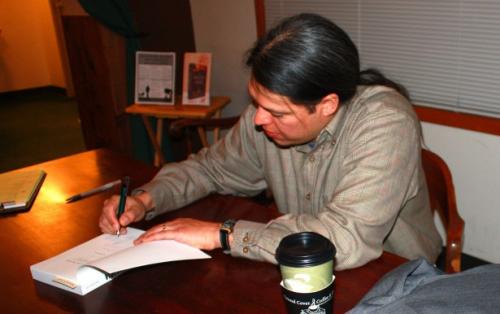
For Professor Ned Blackhawk of Yale University, conventional American Indian history too often involves a study of Native–white relations that ends, Hollywood-style, with the Plains Indian wars of the 19th century. Blackhawk, Te-Moak Tribe of Western Shoshone and a professor of history and American studies, takes a more nuanced view of the ways Indian nations strove to maintain stability after military and political oppression, and draws attention to little-studied areas.
That’s the philosophy underlying Blackhawk’s work in progress, a book interpreting westward expansion from Native and non-Native points of view. His award-winning Violence Over the Land: Indians and Empires in the Early American West (Harvard University Press, 2006) focused on the vast, sparsely settled parts of Nevada, Utah, California, Oregon and Idaho known as the Great Basin—home of the Ute, Paiute, Washoe and Shoshone, and one of the last areas in North America to hold its own outside the sphere of colonization. It won the 2007 Frederick Jackson Turner Award and the 2006 William P. Clements Prize for Best Non-Fiction Book on Southwestern America. Blackhawk spoke with Indian Country Today Media Network earlier this year after a lecture followed by e-mail and phone interviews.
What can you say about your project?
It is a single-volume integrative overview of American Indian history. It will be more interpretive than comprehensive, not descriptive in the textbook sense. The central theme concerns depictions of our shared experiences. It will engage broad interpretations about American Indian and U.S. history, linking the two.
What needs have you seen among Native students?
They grapple with the question, What does American history mean to me? It’s important to characterize the broad swath of Indian history, and the subjects may not be in the textbooks. I try to build an enduring form of institutional space for these and other things—scholarly resources at the highest level.
What should people take away from Violence Over the Land?
That the Great Basin is a part of American history and the American continent that deserves more attention and that many people don’t understand the extent of transformation and endurance that occurred following European settlement. American history has failed to gauge the violence that remade much of the continent before U.S. expansion, and scholars have not fully assessed the effects of such expansion on the many Indian peoples caught within these continental changes.
Read more